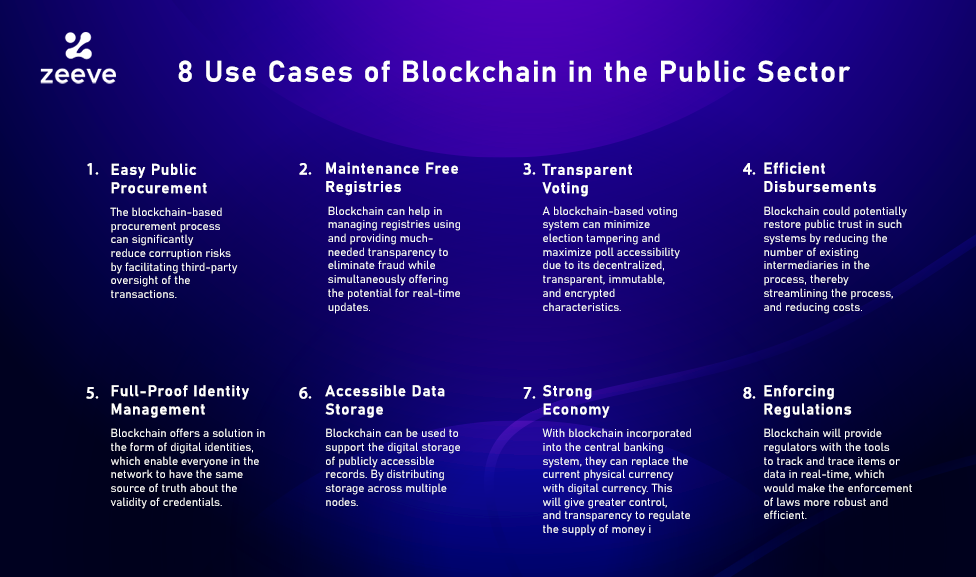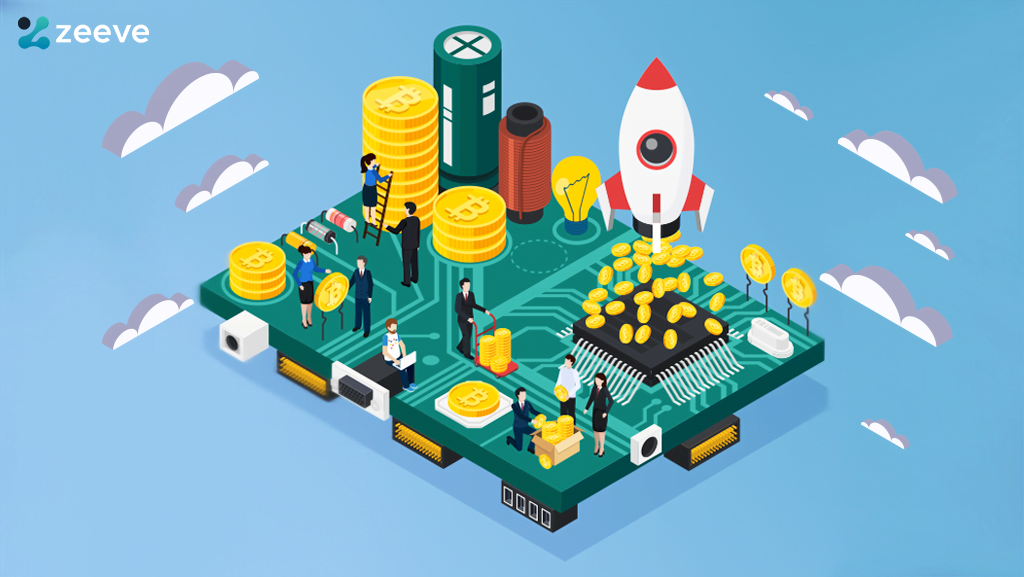India is at a pivotal time of technological evolution, as it’s taking steps in adopting and working on innovative technologies. The government’s drive on digital transactions, streamlining business operations, and making information transparent is opening new business opportunities for innovation and deployment of exponential technologies. As the effects of disruptive digital technologies become clearly evident, blockchain technology as a technology is starting to catch on.
A massive 90% government organizations worldwide are planning to invest in blockchain technology. The reason being the plethora of advantages the blockchain-based technologies offer.
The blockchain is becoming increasingly popular in governments around the world. India and China have regarded the potential that the blockchain may carry for public services since their inception of the technology. Indian regulators, too, have considered the blockchain in tandem with various government agencies in order to develop proof of concepts, run pilots and test its potential.
As per the report by Deloitte the blockchain technology will save $15-20 billion annually in the financial services industry by 2022. Thus, any organization leveraging the technology will be benefitted.
Blockchain-based solutions in the public sector can protect sensitive data, streamline processes, and reduce fraud, waste, and abuse while elevating trust and accountability. Public institutions are responsible for a vast number of trust-related functions and services, which makes blockchain a practical tool for government. Indeed, governments all across the world have taken note of this fact and are examining how they may be able to leverage blockchain technology in their services.
Since 2017, more than 20 countries have started implementing pilots and trials to examine both its broad utility as a basis for government service provision and procurement or individual applications developed on top of this technology For example , Brazilian federal agency Livraria Especializada bookstore tested out an application where customers could order books online using cryptocurrency payments instead .
Throughout this article, we will explore how blockchain could benefit the public sector and how it could compensate for existing deficiencies. You will also be going through the use-cases of blockchain in the public sector. Keep reading!
Benefits of Blockchain in the Public Sector
How many times has your work in the government sector been delayed? You must have that why this even happens. Well, the public sector is suffering from several shortcomings. Blockchain can benefit the telecom industry in overcoming these shortcomings. Some of the most notable benefits are:
Forecast on Global Blockchain Government Market by Geography during the Period 2020-2027
Picture Source , Research Source
- Gaining Lost Trust of the Citizens
OECD research found that only 45% of citizens trusted their government in 2019, and the recent covid pandemic has most likely contributed further to this decline. It’s visible that the trust of citizens in their respective governments is decreasing more than ever.
A lack of trust will compromise citizens’ willingness to cooperate and coordinate with the government on various public policies. The reasons for this distrust are numerous and complex, but blockchain technology has the potential to reverse this trend.
Ethical values such as integrity, fairness, and openness are synonymous and at the core of blockchain technology. Blockchain provides for transparency, accountability, and immutability of the system by allowing the participants on the network to view and verify the data. In addition, blockchain enables peer-to-peer transactions, eliminating the need for intermediaries between transactions and increasing trust.
- Cost Reduction and Increased Efficiency
The public sector and government institutions are plagued with extensive mismanagement of resources and further, the inaccuracy in the calculation of projects, the irresponsible use of funds, etc are the factors that increase the cost of government organizations by manifolds and contribute to their inefficiency.
Blockchain with the aid of smart contracts can reduce cost and increase efficiency by streamlining the current operational model used by government institutions. Smart contracts can help government organizations to automate their processes. As a result, the processes which previously used to take too much time and were prone to the error will now be completed in an instant.
Further smart contracts coupled with the feature of the immutable database of blockchain will provide a transparent and consistent operational model to governmental organizations.
- Protection of Sensitive Data
Breaches of personal data have become the new normal in today’s modern era. Every country has been a victim to these data breaches several times in the past decade and the U.S. leads that chart. The government databases are the prime target for hackers as it serves as society’s default records keeper.
Also, another reason for the exponential rise of attacks on government databases is that records that in the past used to be in paper form are getting digitized now and being recorded in centralized databases. However, rather than accept such attacks as the cost of doing business in the digital age, they could be mitigated or prevented through the responsible deployment of blockchain data structures.
The blockchain will enhance the security of existing databases in two ways:
- by decentralizing the data, and 2) by leveraging cryptography.
Decentralization of the data is done by storing the data on various nodes present on the network. Doing this will eliminate the scope of a single point of failure which is always present in the centralized databases. Also, adding cryptography on top of it makes a system almost unhackable.
- Sharing of Data and Reduction of Bureaucracy
Most government institutions are still relying on piles of paperwork and following outdated networking systems to conduct their operations. A traditional government organization with several layers between top management and front-line employees can slow communications and the flow of information and increase the number of “hands” an issue must pass through before being resolved.
This multi-step process is the cause of hassle to both the public and government officials involved in the process.
The use of blockchain, when incorporated correctly, can streamline the work of government organizations. At present, the data crucial to carry on the functions of government organizations are siloed in various databases of various organizations. Blockchain would provide a uniform network where the data from all the organizations could be present, allowing communication and sharing of data between different organizations would be possible.
8 Use Cases of Blockchain for the Public Sector
Here are the few major use cases that could utilize the potential of blockchain technology and make the public sector more accessible, reliable, and accountable.
Public Procurement
A public procurement program (or government contracting) is the single largest marketplace for government expenditures and the largest source of corruption in government. Processes for vendor selection can be complex sometimes involving a high level of corruption and inefficiency. The blockchain-based procurement process can significantly reduce corruption risks by facilitating third-party oversight of the transactions and facilitating greater uniformity through automated smart contracts, thus increasing the transparency and accountability of transactions and parties involved.
Registries
Worldwide, governments and their legal branches are the primary sources of information for everything from land titles to incorporation of companies, and from marriage and divorce records to criminal records. The management of these registries is a complex process, and reliance on outdated systems and legacy tools has led to corruption, fraud, high costs, and lengthy processing times. Blockchain can help in managing registries using distributed ledgers and provides much-needed transparency to eliminate fraud and corruption while simultaneously offering the potential for real-time updates.
Electronic Voting
The concerns and allegations surrounding election security, voter registration integrity, poll accessibility, and voter turnout are increasing with every election. Counting votes in a timely but secure and transparent manner has become a challenge faced by every government. A blockchain-based voting system can minimize election tampering and maximize poll accessibility due to its decentralized, transparent, immutable, and encrypted characteristics.
Grant Disbursements
Each year, governments give grants of millions of dollars to support a variety of causes, including education, the arts, humanitarian aid, and social assistance, amongst other causes. The process is often inefficient, resulting in money lost to the middleman and banking fees, and opening the door to corrupt financial practices.
Blockchain could potentially restore public trust in such systems by reducing the number of existing intermediaries in the process, thereby streamlining the process, reducing costs, and reducing the possibility of funds being siphoned off.
Digital Identity Management
A functioning economy & society depends on identity, and managing identities is a central function of government. The traditional identity management systems used by the government suffer from a variety of infirmities, such as difficulty accessing data, data insecurity, and fraudulent identity creation.
Blockchain offers a solution in the form of digital identities, which enable everyone in the network to have the same source of truth about the validity of credentials and the verification of data inside credentials without revealing private data.
Data Storage
Data has become the new currency in the modern world, and the government is the custodian of this new currency possessing massive amounts of data of its citizens. Traditional data storage facilities used by the government use centralized servers to store the sensitive data of its citizens, which are prone to data breaches by hackers. Blockchain can be used to support the digital storage of publicly accessible records. By distributing storage across multiple nodes, both the resiliency and the integrity of the data can be ensured.
Central Banking
Worldwide, central banks are still relying on outdated systems and policies to discharge their day-to-day regulation of money in the economy. The ever-rising inflation and constant loss in the value of money are the indicators that they need to change the current way of working.
With blockchain incorporated into the central banking system, they can replace the current physical currency with digital currency, also known as Central Bank Digital Currency (CBDC). These CBDCs will give greater control, transparency, and accountability to regulate the supply of money in the economy to the central banks.
Enforcement of Regulations
For governments, enforcing regulations is as challenging as adhering to regulations for businesses. The phase of digitization of information is underway now, we’re gradually moving past the era of physical documents, and every piece of information is turning into data.
Blockchain-supported distributed ledgers will provide regulators with the tools to track and trace items or data in real-time, making law enforcement more robust and efficient.

Governments employing the blockchain applications
Countries around the world have started to leverage blockchain technology in government-related tasks. Here is a look at a few of such countries:
- UAE
One of the first countries to come forward to embrace blockchain technology is Dubai. As a popular tourist attraction, the country is planning to integrate blockchain to streamline the visa process.
The country is working on three pillars to acknowledge blockchain: industry creation, international leadership, and government efficiency. UAE government estimates that it could save as much as AED 11 billion annually by a paperless transaction system powered by blockchain.
- Estonia
The government of Estonia was one of the first to become a “blockchain government” by venturing into blockchain technology. The country aims to use the Estonian Information Systems Authority (RIA) to enforce blockchain for the integrity of government data and systems.
The Estonian Government uses the technology to manage healthcare, state gazette, surveillance, and many other aspects.
- The United States
In the U.S, blockchain adoption is happening at both the Federal level and also at the local level. The US government is employing blockchain technology in the medical supply chains, identity, securing data, and promoting smart energy grids.
- China
Despite initially taking an aggressive stance against cryptocurrencies, China has been quite positive about blockchain development. China considers that the technology can potentially be applied in massive developments within various sectors. The Chinese blockchain company BSN is planning to expand its services internationally. President Xi Jingping believes that with blockchain, its the time to “seize the opportunities”.
- India
India is planning for the proactive use of blockchain technology. NASSCOM, the technology industry association of India, plans to work with the Blockchain Research Institute (BRI) of Canada. In addition, the Indian Government is using blockchain technology in academic institutions to manage results. Lastly, the government has also rolled out the National Strategy on Blockchain and proposed a blockchain framework to make the technology applicable in different organizations.
Conclusion
A government’s ultimate goal is to serve its citizens as effectively as possible. The blockchain is here to assist them in improving transparency and interaction while reducing the time and cost necessary to provide citizens with far greater value through state services.
As governments worldwide are becoming aware of the potential of blockchain technology, the time is not far when we will see the above-mentioned use cases become a reality.
Zeeve
Zeeve is the leading Blockchain as a Service platform helping enterprises and Blockchain startups build, deploy and manage reliable decentralized apps and Blockchain networks. Zeeve is a low code automation platform that is cloud agnostic and supports multiple Blockchain protocols with advance analytics and monitoring of nodes and networks. Zeeve features a powerful set of APIs to build DApps for plethora of use cases across industries. We have experience of more than 5 years designing enterprise Blockchain solutions in Banking and Financial services space. Zeeve supports Decentralized Finance (DeFi) space with decentralized storage, trusted nodes and smart contracts. For more details, schedule a free call with our DeFi specialist.





